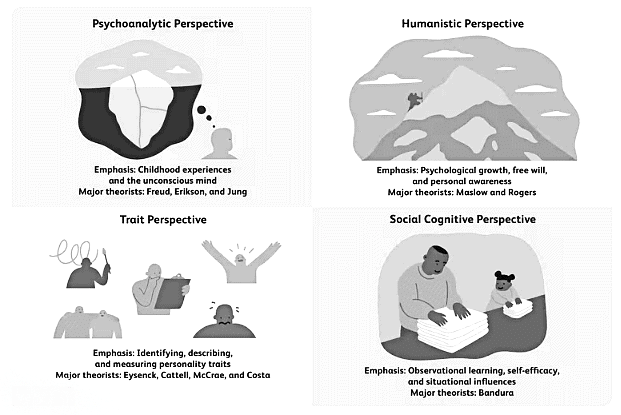Theories of Personality | Psychology for UPSC Optional (Notes) PDF Download

Psychoanalytic Perspective: Unveiling the Unconscious Mind
The psychoanalytic perspective, pioneered by renowned psychiatrist Sigmund Freud, highlights the significance of early childhood experiences and the hidden workings of the unconscious mind. Freud believed that the unconscious could be accessed through dreams, free association, and slips of the tongue. Other influential theorists such as Erik Erikson, Carl Jung, Alfred Adler, and Karen Horney built upon Freud's theories while also offering their own insights.
Key Theorists in the Psychoanalytic Perspective:
- Sigmund Freud: Emphasized the role of early childhood events, the influence of the unconscious, and sexual instincts in shaping personality.
- Erik Erikson: Focused on the social elements of personality development, including the identity crisis, and highlighted how personality evolves throughout one's lifespan.
- Carl Jung: Explored concepts such as the collective unconscious, archetypes, and psychological types.
- Alfred Adler: Argued that the core motivation behind personality revolves around the pursuit of superiority, stemming from universal feelings of inferiority.
- Karen Horney: Stressed the need to overcome basic anxiety and emphasized the impact of societal and cultural factors, particularly the parent-child relationship, on personality development.
Modern Relevance: While classical Freudian psychoanalysis has faced skepticism, the psychodynamic tradition still plays a vital role in psychology. Psychodynamic approaches offer effective tools for self-examination and contribute to long-term emotional growth.
Humanistic Perspective: Embracing Individual Potential
The humanistic perspective of personality centers on psychological growth, free will, and personal awareness. This optimistic viewpoint embraces the belief in the inherent goodness of individuals and emphasizes their ability to achieve their full potential.
Key Theorists in the Humanistic Perspective:
- Carl Rogers: Advocated for the significance of free will and psychological growth, asserting that the actualizing tendency drives human behavior.
- Abraham Maslow: Proposed the hierarchy of needs, asserting that people are motivated by fulfilling basic survival needs, leading to higher needs such as esteem and self-actualization.
Modern Relevance: Humanistic psychology continues to influence psychotherapy, and the field of positive psychology, derived from humanist traditions, aims to enhance individuals' well-being. Humanistic therapy has been successful in treating various mental health conditions and personality disorders.
Trait Perspective: Unraveling Individual Differences
The trait perspective focuses on identifying, describing, and measuring specific traits that constitute human personality. Researchers believe that comprehending these traits enables a better understanding of individual differences.
Key Theorists in the Trait Perspective:
- Hans Eysenck: Proposed three dimensions of personality—extraversion-introversion, emotional stability-neuroticism, and psychoticism.
- Raymond Cattell: Identified 16 personality traits to assess individual differences in personality.
- Robert McCrae and Paul Costa: Introduced the big five theory, which identifies five fundamental dimensions of personality—extraversion, neuroticism, openness to experience, conscientiousness, and agreeableness.
Modern Relevance: Trait theory remains a prevalent approach in understanding human personality. While researchers have expanded their focus to explore the development of traits and their impact on mental well-being, understanding these traits offers valuable insights into behavior and individual experiences.
Social Cognitive Perspective: Emphasizing Observational Learning
The social cognitive perspective highlights the importance of observational learning, self-efficacy, situational influences, and cognitive processes. This perspective suggests that personality is shaped through observation, imitation, and modeling, while cognitive factors and the interaction between individuals, their environment, and their thoughts further contribute to their behavior and personality.
Key Theorist in the Social Cognitive Perspective:
- Albert Bandura: Advocated for social learning and emphasized the role of conscious thoughts, particularly self-efficacy.
Modern Relevance: The social cognitive perspective remains relevant in understanding how learning occurs in social contexts. It has practical applications in areas such as education, public health, and the development of programs aimed at fostering healthier behaviors and choices.
Conclusion: Expanding our Understanding of Personality
Each perspective on personality—psychoanalytic, humanistic, trait, and social cognitive—offers valuable insights into different aspects of human personality. While no single theory can fully explain the complexities of personality, together they enrich our understanding of the causes, formation, and behavior associated with personality traits. Exploring these perspectives provides a holistic understanding of the multifaceted nature of human personality and contributes to the advancement of psychological knowledge.
|
160 videos|215 docs
|





















